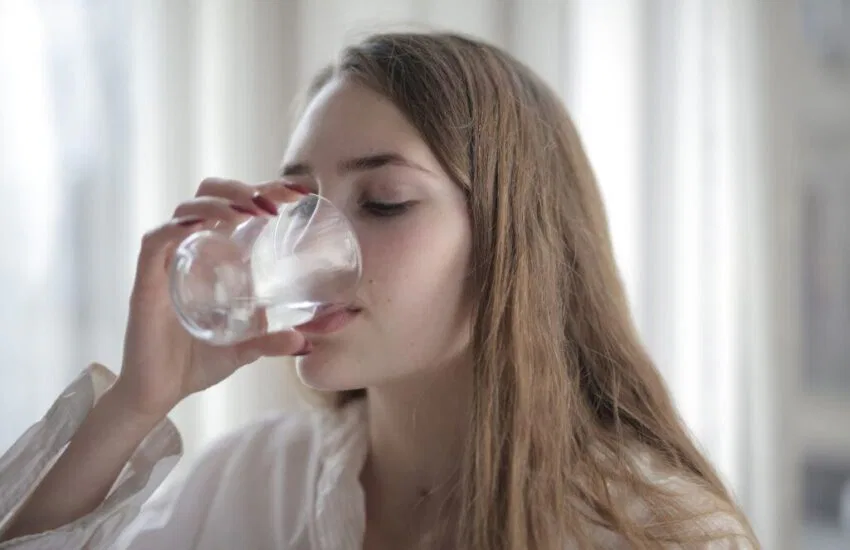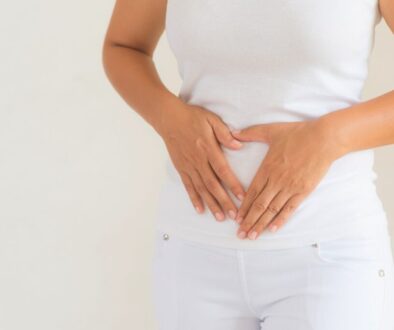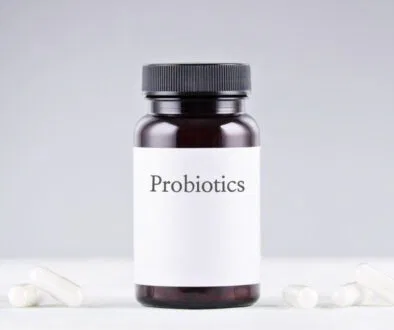Can Dehydration Cause Coughing? Not Directly

Published November 4, 2023
Dehydration is a lack of enough water in our body. The best way to beat it is to consume liquid before you get thirsty. And if you’re thirsty, you’re already mildly dehydrated. Dehydration can cause headaches, fatigue, and dizziness, among other symptoms.
Can dehydration cause coughing? It is not a symptom of it. Yet, many are curious if they are linked to one another. Read for an expert health guide about the correlation between the two. We’ll discover what dehydration is and the signs of it. We’ll answer if it can cause coughing. We’ll also discuss all the ways to treat both coughing and dehydration. Bonus topic: probiotics can treat cough. Let’s get started.
What Is Dehydration?
Dehydration is when you lose so much body fluid that you can’t function normally. It happens when you lose more fluid than you take in. It manifests on a scorching day if you sweat a lot. It can also occur if you’re sick with fever, diarrhea, or vomiting. Also, you can experience it if you don’t drink enough water. Finally, if you’re taking a medication that boosts your urine output.
When you aren’t adequately hydrated, your body’s natural response is thirst. You should respond to it by drinking fluids, preferably water.
You can usually treat mild dehydration by consuming more fluids. Yet, dehydration isn’t always easy to spot. It can manifest in an aging parent who forgets to drink water. Also, in a fussy baby who can’t communicate to you their thirst. This being said, you must make an effort to keep your loved ones hydrated.
If you or your loved one has moderate to severe dehydration, you may need to check in a hospital to get IV fluids. If left ignored, severe dehydration can be fatal.
Signs of Dehydration
- Signs of mild or moderate dehydration include:
- Thirst
- Dry or sticky mouth
- Not peeing regularly
- Dark yellow urine
- Dry, cool complexion
- Headache
- Muscle cramps
Signs of Severe Dehydration
- Not peeing or having very dark yellow pee
- Dehydrated skin
- Feeling dizzy
- Rapid heartbeat
- Rapid breathing
- Sunken eyes
- Sleepiness, lack of energy, confusion or irritability
- Fainting
Symptoms for Babies and Young Children Can Differ for Adults.
- Dry mouth and fatigue
- No tears when crying
- Dry diapers for hours
- Sunken eyes, cheeks, soft spot on the top of the skull
- Sleepiness, lack of energy, or irritability
What Causes Dehydration?
Dehydration manifests in times when you fail to drink enough water. It also happens when you lose moisture quickly, for once, sweating, vomiting, or diarrhea. Certain medications like diuretics can also increase urination and dehydration.
Can Dehydration Cause Coughing?
According to research, dehydration doesn’t directly cause coughing. However, it increases the likelihood of someone coughing for different reasons. If a person is sick or ill, it is not guaranteed that coughing will be one of their symptoms. Yet, if they don’t drink adequate liquid amidst sickness, the chances of coughing will increase. Coughing, then, we can conclude, is more prevalent in dehydrated people.
Why Does Dehydration Increase Your Chances of Coughing?
Your airway’s mucus will become sticky if you do not hydrate yourself sufficiently. It is as opposed to being watery if you’re drinking enough water.
Since sticky mucus doesn’t drain quickly, it will irritate your throat once it reaches that point. The itch that comes from your throat will then provoke a cough. Thereby, dehydration can impact coughing.
The good news, though, is it is not usually the case. The airways don’t generate too much mucus anyway. There’s no mucus build-up happening at any point in time. The only time it does is when you’re sick, infected, or having allergies.
All the Ways to Treat Dehydration
1. Respond to thirst when the feeling strikes.
It is easy to get wrapped up in day-to-day activities. It can be easy to forget to answer your thirst cues. It is our body’s way of communicating with you that you need more fluids.
Keep a water bottle at all times. Take a swig whenever thirst strikes.
2. Evaluate the inside of your mouth for dehydration symptoms.
Another simple way to gauge how well-hydrated you are is by checking the moistness of the inside of your mouth. Check the mucus membrane. It is checking the inside of your mouth. If you notice it is starting to get dry, you know you’re running low on water.
3. Ignore the popular rule to drink eight glasses of water a day.
For most of us, eight glasses of water daily isn’t cut. This long-standing advice is only a general guideline. There may not be enough fluid intake in more dehydrating environments or situations.
4. Boost your water intake when exercising.
Your body demands more liquid when you’re exercising at a high intensity. Fluid loss through working out can be significant in the setting of an endurance athlete. Some highly talented athletes can lose up to 10 percent of their body weight. It is done through sweat during an athletic event.
You need to drink a volume more significantly than you lost during a physical activity. It will aid in restoring water balance.
5. Bring in extra electrolytes when needed.
Drinking plain water is adequate to fend off dehydration. Yet, certain situations call for something more.
You might consider replenishing your electrolytes if you can engage in physical activities that last more than 60 minutes. It is most easily accessible through a sports drink.
Drink that has sodium or carbohydrates, such as carbohydrate electrolytes, and sports drinks can aid in your recovery.
Milk can also help. It has been shown to support rehydration. It is due to its sodium, carbohydrate, and protein content.
6. Drink more water when you’re sick or on a hot day.
Those dealing with severe cases of vomiting and diarrhea are at risk of becoming dehydrated.
Hot weather is also a clue that you need to up your water intake. If it’s hot outside, it’s always better to have more fluid.
7. Think beyond plain water to help alleviate dehydration.
Water should undoubtedly be your first choice when looking to rehydrate. Yet, all fluid counts when it comes to hydration. You can reach for coffee, juices, and tea as well. Just know their sweetened variations will never beat out plain water in the healthfulness competition.
You can also safeguard against dehydration by filling your diet with fruits and vegetables abundant in water content. Fruits like cantaloupe, strawberries, and watermelon consist of 90 to 99 percent water. Apples, oranges, and pineapples are between 80 to 89 percent water.
8. Drink a glass of water when you wake up.
In addition to paying awareness to what you’re drinking, paying attention to the when is equally essential. Start your day with a glass of water. Spending eight hours in slumber, your body is likely to wake up in a dehydrated state.
All the Ways to Treat Coughing
Since we’re on whether dehydration can cause cough, and we’ve proven it wrong, treating cough is a topic worth touching.
1. Drink lots of fluids.
When you’re sick, mucus can accumulate on the back of your nose—staying hydrated thins the drip. It is critical to tame irritation on your note and keep coughs at bay. Hydration will also make it easier for your lungs to clear the discharge.
A parched body may force your immune system to release more histamines. These chemicals swell your nose and produce more mucus. It can set off a cough.
2. Swallow some honey
Honey can soothe the scratchiness in the back of your throat. One study found that it works just as well as over-the-counter drugs for alleviating nighttime coughs. Take a tablespoon as needed. You can also opt for stirring it into warm milk. Do not give honey to babies under 1.
3. Look to nature
Other natural remedies may include aloe and menthol. The two can help decrease inflammation of the upper airways.
4. Sip a hot drink.
Research suggests that it can ease cold symptoms, including a cough. The liquids are hydrating, and the heat alleviates congestion. It would help to brew some calming chamomile tea. Ginger tea is another good choice. The spicy root in the latter may aid in relaxing the smooth muscles in your airways.
5. Over-the-counter options
Some natural OTC products contain very low doses of aspirin. They aid in reducing the symptoms of sore throat and cough.
6. Clear irritants from your home
Some people are sensitive to fragrances and perfumes. The two are present typically in laundry detergents and air fresheners. They may introduce irritation in the sinuses and up mucus production.
Suppose you have allergies. Cleaning away mold, dust, and pollen may aid. These allergens may introduce a reaction, including a cough. You may be required to wash your sheets in hot water. Also, clean your floors with a HEPA filter vacuum. Finally, scrub windows with a bleach solution.
7. Sleep on an incline.
Raise your head if a cold or an allergy is behind your cough. When you lie flat, the mucus can pool and anger your throat. To set gravity on your side, use an extra pillow. You can also raise your headboard with a stable surface.
8. Gargle salt water
Gargling also helps loosen thick mucus aside from healing a sore throat. Moreover, it helps clear away allergens and bacteria.
9. Stamp out cigarettes
Smoking paralyzes the tiny hairs lining your lungs, called the cilia. Cilia are responsible for clearing out mucus and dirt. It is the reason why some smokers get a long-term cough. Modern research also rules the same may happen with vaping.
10. Moisten the air
A steamy shower or bath can aid in loosening the mucus and congestion behind your cough. Here, a humidifier may also help.
11. Rinse your nose
Rinsing your nose will flush out cough-inducing mucus along allergens from your nasal passages and sinuses. It helps to use a saline spray or nasal irrigation.
Probiotics for Coughing
Bionaze is an oral probiotic designed to improve sinus, ear, nose, and throat health. It is a high-quality probiotic that supports upper respiratory health. It will also boost your immune system and promote proper drainage and viscosity, impacting decreased phlegm.

Frequently Asked Questions About Dehydration and Coughing
1. Is dry cough due to dehydration?
Dehydration can contribute to a dry cough. Yet, it is not the direct cause of it. Dehydration can lead to a dry throat and irritation, which can manifest as a dry cough.
2. Can drinking water help cough?
Drinking water can help with a cough. Staying adequately hydrated can help soothe an irritated throat and thin mucus. It will make it easier to cough up. In addition, you can also drink warm fluids like tea or soup. The two can provide additional relief for cough symptoms.
3. Why am I coughing so much but not sick?
Excessive coughing without being sick can have several potential causes. It may be due to a post-nasal drip, asthma, GERD, respiratory tract infection, or allergies.
4. What are two warning signs of dehydration?
Extreme thirst and decreased urine output, and it is dark colored. These two are common warning signs of dehydration.
And the answer is all straightened and confirmed. Dehydration does not cause coughing. What it does do is increase the chances or likelihood of someone coughing for different reasons.
Benefit From The Latest Advancements In Probiotic Science With Bionaze
Bionaze is a proprietary blend of probiotics proven to promote ear, nose, and throat health, improve digestion, and support your immune system. The active ingredients BLIS K12, and BL-04 are considered among the best probiotics according to science.
Get 25% Off Your First Order when you use BIO25 at checkout!

This Content Has Been Reviewed For Factual Accuracy
This content has undergone thorough fact-checking by our team of internal experts. Learn more about the meticulous editorial standard for our website here.
ADVERTISEMENT

About The Author
I am Tracy Gorman, a seasoned writer passionate about creating helpful content. I can delve into any niche and produce valuable articles with my expertise. Beyond writing, I am an avid learner with a passion for digital marketing. During my leisure time, I enjoy immersing myself in literature, experimenting with fashion, staying active, exploring culinary delights, indulging in movies, savoring music, and socializing. And, it’s safe to say, I love cats!




